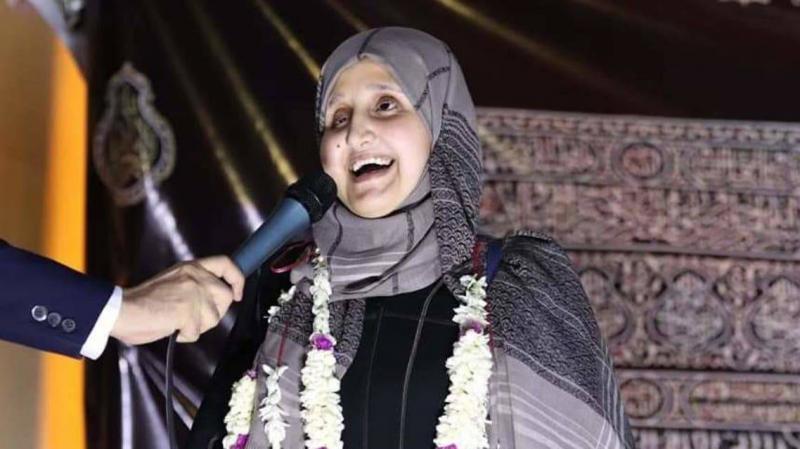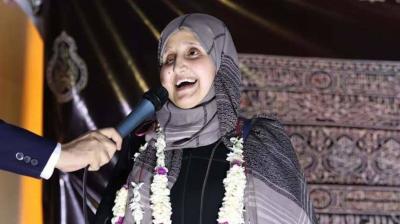A talented Yemeni woman with determination recently won third place in the Arab world and first place in Yemen in the art of public speaking and poetry recitation in Modern Standard Arabic. During her honoring by the Culture Office in Taiz, Yemen, she received a symbolic gift from Prime Minister Maeen Abdulmalik, supporting and encouraging her for overcoming the challenge of blindness that has accompanied her life, as well as appreciating her resolve to inspire many women, whether they face similar struggles or hardship due to difficult living conditions.
Hadeel, 23, was overjoyed on the honor platform, describing that moment as a pivotal and exceptional point in her life, as it crowned a long-awaited dream that may ease some of her suffering. Hadeel is an orphan and the only daughter of a blind mother, boasting an impressive high school score of 95%.
Hadeel Abdullah Al-Shurmany believes that the paths of light are filled with thorns and obstacles, yet she decided to envision her dream amidst the darkness. Although she was born blind, Hadeel vowed from a young age to challenge the darkness with her insight, proving to the world that she can resist pain with hope. Like others with similar challenges, they are no longer forgotten creators or marginalized women but rather spirits that feel and minds that think and decide, dreaming of a better tomorrow and demanding a fair share of life.
At 23, Hadeel demonstrates that the true blind person in her country is the uneducated individual who lives in darkness without knowledge, purpose, or morals. The daughter of Taiz has elevated Yemen's name in Arab forums for her eloquence and performance mastery. She hopes for an end to the conflicts and wishes to see her sorrowful country happy again, as it was for thousands of years. Hadeel is also proficient in writing, sharing pearls of poetry, stories, and philosophical reflections on her Facebook page.
In a reflection on the reality of the siege, Hadeel states: "On September 26, 1962, truth triumphed over falsehood, knowledge over ignorance, equality over classism, and freedom over slavery. On that day, the followers of the Prophet Muhammad, peace be upon him, triumphed over those who claimed to be his descendants, ending the era of thieves who impoverished the people, leaving them barefoot and naked, ignorant and poor, while the imams sold their grain to foreigners for golden pounds."
Hadeel pours out her sorrow in a concise narrative of her suffering: "I am from Taiz, the province that has been exhausted by the siege, from the city filled with love, where passion resides in the hearts of its people who breathe freedom and know no path to despair. I am from the city that embraces everyone, the city that triumphs every time; I am the towering Mount Saber, I am all the places and villages within it."
Hadeel continues: "I am from Taiz, which sends its doctors to heal the wounds of Sana'a, its teachers to Ma'rib, and its engineers to Aden. I am from the city that serves as an admirable example wherever you go in Yemen. I am from the city of culture and knowledge that despises ignorance and injustice and refuses to succumb to the grip of violence and oppression. I am from the forsaken city that conquers war with love, teaching its children to smile despite bleeding wounds; Taiz, which has been scarred by destruction, will not die but will always live and be reborn a thousand times from the rubble."
Hadeel faced significant challenges to secure a place in her studies while other healthy youth left their schools to join the front lines. She considers the Braille system for the blind to be a window of light that allowed her to absorb various sciences and cultures, read the Quran, and enjoy its meanings. She mentions that the inventor of this system, Frenchman Louis Braille, was recognized for his invention while lying on his deathbed. The original twelve dot configuration was later reduced to six dots, which is what we use today, with the complete cell being six dots resembling the Arabic letter "ظ".
Hadeel addresses sighted people: "Our curricula do not differ from yours in anything except that we read with our fingers while you read with your eyes." Yemen ranks fifth in the Middle East and fourth in the Arab world for printing the Quran. The Braille method is taught to the blind at the Aman Center for Training and Community Rehabilitation and the Noor Center for the Blind in the Yemeni province.
Moreover, millions of people with determination in the impoverished country continue to suffer from social integration challenges, enduring severe psychological harm from being ridiculed, exploited, or pitied. Hadeel recounts an experience shared by one of her friends: "I was walking down the street with my mother, and we were strolling slowly when suddenly someone spat at us from his car, saying, 'Why are you wavering like that in the road?' not realizing that she was wearing sunglasses and was, in fact, blind."
Hadeel shares another incident involving a girl who fell into a hole due to random excavations, turning the scene into a spectacle with no one helping her. Another scene involved blind friends who went out for lunch at a restaurant, only for one man behind them to mumble derogatory remarks about "blind girls" being out in public, leaving them to wonder if he meant they should not be allowed to eat or drink outside.
In this context, Hadeel delivers a message to Yemeni society, which she extends to Arab communities lacking a culture of kindness towards people with disabilities: "Before you judge a girl or boy and hurt them with your words or bully them, ensure that they may be someone with a determination disability."
Hadeel also urges drivers to be cautious: "If you can help a blind person cross the street, or alert them to the existence of a hole ahead, or something that could harm them, you should be their eyes. Do not look at them with exaggerated sympathy or treat them with pity, as this deeply wounds their feelings of lack. I kindly ask bus drivers, bikers, and car drivers to slow down when you encounter blind individuals walking slowly; please give them the right of way to cross, and don't rush, as it could cause serious accidents that would victim innocent people with disabilities."




